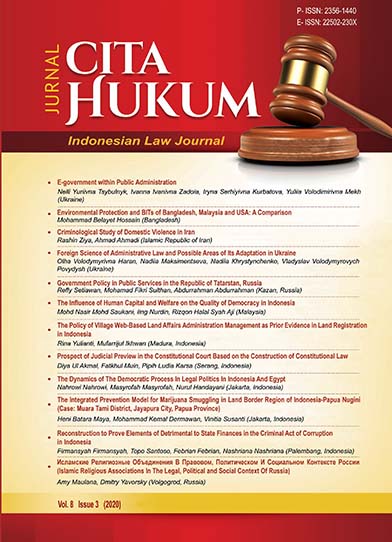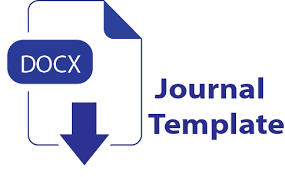E-government within Public Administration
DOI:
https://doi.org/10.15408/jch.v8i3.18300Keywords:
public administration, e-government, high technologies, administrative activity, modern means, effective strategies, legal regulation.Abstract
Abstract
The purpose of the article is to determine the nature, content, and characteristic features of e-government, as well as to analyze its impact on the implementation of public administration. While writing the article the following methods were used: logical, semantic, method of documentary analysis, and comparative legal. Specific features of modern models of e-government in the world have been analyzed; the expediency of introduction of the optimal model of the specified kind of government into the state system of Ukraine has been researched. The influence of modern high-tech means of e-government on the existing public administration systems in the world has been studied. The author has suggested their definitions of «e-government», «public administration» and «e-governance». Authors have defined the perspective directions of the development of this sphere, which need to be developed to improve the general situation in the field of public administration. A comparative analysis was carried out with the leading countries in this field. Particular attention has been paid to the successful experience of developed foreign countries in organizing the process of e-government as a perspective form of public administration.
Keywords: public administration, e-government, high technologies, administrative activity, modern means, effective strategies, legal regulation
Abstrak
Artikel ini bertujuan untuk mengetahui sifat, isi dan ciri khas e-government, serta menganalisis dampaknya terhadap penyelenggaraan administrasi publik. Saat menulis artikel metode berikut digunakan: logis, semantik, metode analisis dokumenter dan hukum komparatif. Ciri-ciri khusus model modern e-government di dunia telah dianalisis; kemanfaatan pengenalan model optimal dari jenis pemerintah tertentu ke dalam sistem negara Ukraina telah diteliti. Pengaruh sarana e-government berteknologi tinggi modern pada sistem administrasi publik yang ada di dunia telah dipelajari. Penulis telah menyarankan definisi «e-government», «administrasi publik» dan «e-governance» sendiri. Penulis telah menentukan arah perspektif perkembangan bidang ini, yang perlu dikembangkan untuk tujuan memperbaiki situasi umum di bidang administrasi publik. Analisis komparatif dilakukan dengan negara-negara terkemuka di bidang ini. Perhatian khusus telah diberikan pada pengalaman sukses negara-negara asing maju dalam menyelenggarakan proses e-government sebagai bentuk perspektif administrasi publik.
Kata Kunci: Administrasi Publik, E-Government, Teknologi Tinggi, Kegiatan Administrasi, Sarana Modern, Strategi Efektif, Regulasi Hukum
Аннотация
Целью статьи является определение сущности, содержания и характерных особенностей электронного управления, а также анализ его влияния на осуществление публичного администрирования. В работе анализируются особенности современных моделей электронного управления в мире, а также изучается целесообразность внедрения оптимальной модели указанного вида управления в государственную систему Украины. Рассмотрено влияние современных высокотехнологичных средств электронного управления на ныне существующие в мире системы публичного администрирования. Предлагается авторское определение понятия «электронное правительство», «публичное администрирование» и «электронное управление». Определяются перспективные направления развития этой сферы, которые нужно развивать для улучшения общей ситуации в области публичного администрирования. Обращается внимание на успешный опыт развитых зарубежных стран в организации процесса электронного управления как перспективной формы публичного администрирования.
Ключевые слова: публичное администрирование, электронное управление, высокие технологии, управленческая деятельность, современные средства, эффективные стратегии, правовое регулирование, зарубежный опыт
References
Barikova, A. A. (2016). E-state: A New Efficiency of Government: monograph. Kyiv: Yurinkom Inter.
Becker J., Niehaves B., Algermissen L., Delfmann P. & Falk T. (2004). E-Government Success Factors. In: Traunmüller R. (eds) Electronic Government. EGOV 2004. Lecture Notes in Computer Science, Vol. 3183. Springer, Berlin, Heidelberg. https://doi.org/10.1007/978-3-540-30078-6_87.
Becker, J., Algermissen, L., Niehaves, B. (2003). Electronic Government – Status quo and development perspectives. Working paper, No. 94 - Department of information systems, University of Muenster. Muenster.
Gil-Garcı´a, J. Ramo´ n, & Luna-Reyes, Luis F. (2003). Towards a definition of electronic government: A comparative review. In Mendez-Vilas A., et al. (Eds.), Techno-legal aspects of information society and new economy: An overview. Extremadura, Spain7 Formatex Information Society Series.
Gil-Garcı´a, J. R. & Pardo, T. A. (2005). E-government success factors: Mapping practical tools to theoretical foundations. Government Information Quarterly. No. 22, 187–216.
Iglesias Alonso, Á. H. & Barbeito Iglesias, R. L. (2020). Participatory Democracy in Local Government: An Online Platform in the City of Madrid. Croatian and Comparative Public Administration. Vol. 20. No. 2, 241–268. http://doi.org/10.31297/hkju.20.2.3.
Kalvet, T. (2012). Innovation: a factor explaining e-government success in Estonia. Electronic Government, An International Journal. Vol. 9. No. 2. 142-157.
Kalvet, T. The Estonian Information Society Developments Since the 1990s, Working Paper No. 29, Praxis Centre for Policy Studies, Tallinn, 2007.
Khomy, N. M. (general ed.) (2015). The Latest Political Vocabulary (Neologisms, Occasionalisms and Other Innovations). Lviv: “Novyi Svit – 2000”.
Malynovskyi, V. Ya., Hrytsiak, N. V. & Semenchenko, A. I. (2017). E-government and E-democracy: manual: in 15 parts. Part 1: Introduction into course. Conceptual principles of e-government and e-democracy. K.: FOP Moskalenko O. M., K.
On Approval of the Concept of E-government Development in Ukraine: Order of the Cabinet of Ministers of Ukraine No. 2250-r dated from 13 December 2010. Retrieved from https://zakon.rada.gov.ua/laws/show/2250-2010-%D1%80#Text».
On Approval of the Concept of E-government Development in Ukraine: Order of the Cabinet of Ministers of Ukraine No. 649-r dated from 20 September 2017. Retrieved from https://zakon.rada.gov.ua/laws/show/649-2017-%D1%80#Text.
On the Program of Activities of the Cabinet of Ministers of Ukraine: Resolution of Verkhovna Rada of Ukraine No. 26-VIII dated from 11 December 2014. Retrieved from https://zakon.rada.gov.ua/laws/show/26-19#Text.
On the Program of Activities of the Cabinet of Ministers of Ukraine: Resolution of Verkhovna Rada of Ukraine No. 1099-VIII dated from 14 April 2016. Retrieved from https://zakon.rada.gov.ua/laws/show/1099-19#Text.
On the Sustainable Development Strategy of Ukraine “Ukraine – 2020”: The Decree of the President of Ukraine No. 5/2015 dated from 12 January 2015. Retrieved from http://zakon.rada.gov.ua.
Rana, N. P., Dwivedi, Y. K., & Williams, M. D. (2013). Analyzing challenges, barriers and CSF of egov adoption. Transforming Government: People, Process and Policy. No. 7(2), 177-198.
Recommendation Rec (2004)15 of the Committee of Ministers on electronic governance. Retrieved from https://search.coe.int/cm/Pages/result_details.aspx?ObjectID=09000016805db3b.
Semenchenko, A. I. & Serenok, A. O. (2017). E-government and E-democracy: manual: in 15 parts. Part 2: E-government: basics and strategies of realization. Kyiv: FOP Moskalenko.
Smirnova, N. (2020). E-government and social media in Ukraine: global challenges for legal regulations. Lex Portus. No. 1, 69-84. https://doi.org/10.26886/2524-101X.1.2020.5.
Solomko, Yu. (2018). E-government: concept, essence, principles and directions of development. Efficiency of e-governance. Issue 2(55), 135-143.
Volokh, O. K. (2016). Electronic Governance as a Form of Public Administration. Juridical scientific and electronic journal. No. 6, 140-143.
Yekhanov, V. V. (2012). Problems and Prospects of E-government System Implementation in Ukraine. Retrieved from http://www.kbuapa.kharkov.ua/e-book/db/2012-2/doc/1/05.pdf.
Ziemba, E., Papaj, T. & Jadamus-Hacura, M. (2015). E-government success factors: a perspective on government units. Issues in Information Systems. Vol. 16. Issue II, 16-27











